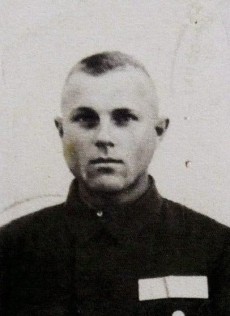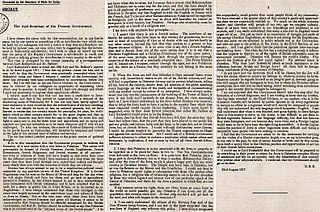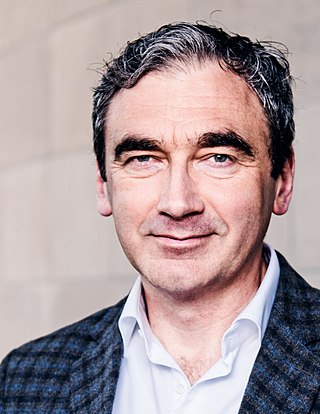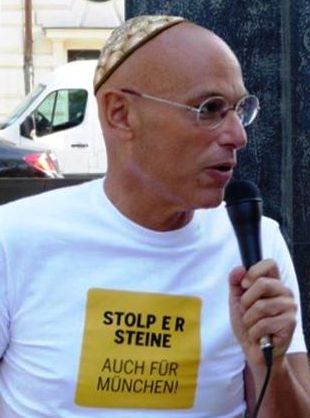
John Demjanjuk was a Trawniki man and Nazi camp guard at Sobibor extermination camp, Majdanek, and Flossenbürg. Demjanjuk became the center of global media attention in the 1980s, when he was tried and convicted in Israel after being misidentified as "Ivan the Terrible", a notoriously cruel watchman at Treblinka extermination camp. In 1993 the verdict was overturned. Shortly before his death, he was tried and convicted in the Federal Republic of Germany as an accessory to the 28,060 murders that occurred during his service at Sobibor.

Marcel Reich-Ranicki was a Polish-born German literary critic and member of the informal literary association Gruppe 47. He was regarded as one of the most influential contemporary literary critics in the field of German literature and has often been called Literaturpapst in Germany.

The Tarragon Theatre is a theatre in Toronto, Ontario, Canada, and one of the main centers for contemporary playwriting in the country. Located near Casa Loma, the theatre was founded by Bill and Jane Glassco in 1970. Bill Glassco was the artistic director from 1971 to 1982. In 1982, Urjo Kareda took over as artistic director and remained in that role until his death in December 2001. Richard Rose was appointed artistic director in July 2002. Mike Payette assumed the role of artistic director in September 2021 upon Rose's retirement, with Lisa Li joining as Executive Director in June 2024.
New antisemitism is the concept that a new form of antisemitism developed in the late 20th and early 21st centuries, typically manifesting itself as anti-Zionism. The concept is included in some definitions of antisemitism, such as the working definition of antisemitism and the 3D test of antisemitism. The concept dates to the early 1970s.

Nathan Birnbaum was an Austrian writer and journalist, Jewish thinker and nationalist. His life had three main phases, representing a progression in his thinking: a Zionist phase ; a Jewish cultural autonomy phase, which included the promotion of the Yiddish language; and a religious phase, when he turned to Orthodox Judaism and became staunchly anti-Zionist.

Matthias Küntzel, is a German political scientist and historian. He was an external research associate at the Vidal Sassoon Center for the Study of Antisemitism (SICSA) at the Hebrew University of Jerusalem from 2004 to 2015. Currently, he is a member of the German Council on Foreign Relations DGAP and of the advisory board of UANI.
Kenneth S. Stern is an American attorney and an author. He is the director of the Bard Center for the Study of Hate, a program of the Human Rights Project at Bard College. From 2014 to 2018 he was the executive director of the Justus & Karin Rosenberg Foundation. From 1989 to 2014 he was the director of antisemitism, hate studies and extremism for the American Jewish Committee. In 2000, Stern was a special advisor to the defense in the David Irving v. Penguin Books and Deborah Lipstadt trial. His 2020 book, The Conflict Over the Conflict: The Israel/Palestine Campus Debate, examines attempts of partisans of each side to censor the other, and the resulting damage to the academy.

Harald Martenstein is a German journalist and author.

Anti-Zionism is opposition to Zionism. Although anti-Zionism is a heterogeneous phenomenon, all its proponents agree that the creation of the modern State of Israel, and the movement to create a sovereign Jewish state in the region of Palestine—a region partly coinciding with the biblical Land of Israel—was flawed or unjust in some way.
Hannah Moscovitch is a Canadian playwright who rose to national prominence in the 2000s. She is best known for her plays East of Berlin, This Is War, "Old Stock: A Refugee Love Story", and Sexual Misconduct of the Middle Classes, for which she received the 2021 Governor General's Award for English-language drama.
Torkel S Wächter a.k.a. Tamara T is a German-Swedish novelist and airline captain.

Andreas Krause Landt, also known as Andreas Lombard, is a German journalist and publisher of Jewish ancestry, and the author of popular history books.

Samuel Lublinski was a Berlin-based writer, literary historian, critic, and philosopher of religion. He was a pioneer of the socio-historical study of literary movements and a major contributor to the debates about German-Jewish national and cultural identity of the era.

Terry Swartzberg is an American public affairs campaigner and journalist. He is based in Munich, Germany and contributed for 25 years to the International Herald Tribune and other international publications. He is especially known for his work for the holocaust memorial project Stolpersteine and for his "reality check" - since 2012 he has been wearing a kippah in public.

Hermann Simon is a German historian who was for 27 years director of the Foundation "New Synagogue Berlin - Centrum Judaicum".
Shaul Bustan, is an Israeli composer, conductor, Oud player, mandolinist and double bassist who has worked with several influential orchestras and ensembles throughout Israel, Germany, Austria, Netherlands and the USA including the Israel Philharmonic Orchestra, the Los Angeles Jewish Symphony, Koninklijke Harmoniekapel Delft, the Tiroler Ensemble für Neue Musik and klezmer-maestro Giora Feidman.

Salomon Korn is a German architect and an honorary senator of Heidelberg University. Since 1999 he has served as chairman of the Jewish Community of Frankfurt am Main and since 2003 as vice president of the Central Council of Jews in Germany.
Georg Heuberger was founding director of the Jewish Museum Frankfurt and representative of the Claims Conference.
Jüdische Rundschau was a Jewish periodical that was published in Germany between 1902 and 1938. It was the biggest Jewish weekly publication in Germany, and was the origin of the Zionist Federation of Germany.

Viola Roggenkamp is a German journalist-commentator and writer. The themes to which she most often returns are those surrounding Feminism and Judaism in Germany during and following the brutish middle years of the twentieth century. Although these topics have been much revisited by scholars and critics throughout her lifetime, several of Roggenkamp's own perspectives and conclusions are well outside the mainstream. Her output includes literary portraits, essays, opinion pieces and novels.












